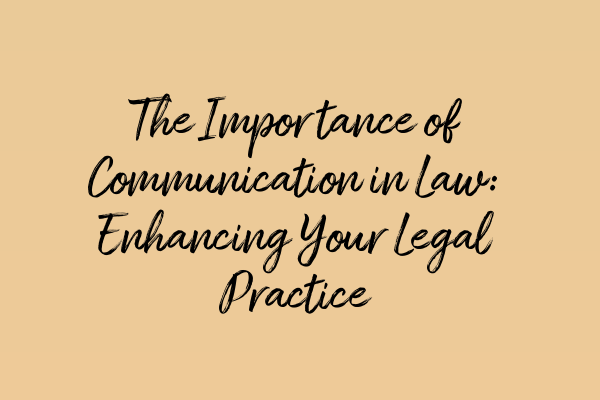TITLE: The Importance of Communication in Law: Enhancing Your Legal Practice
Introduction:
Welcome to Becoming Solicitor SRA! As a solicitor, effective communication is a cornerstone of your legal practice. It not only builds trust and credibility with your clients but also contributes to positive outcomes in legal proceedings. In this blog post, we highlight the crucial role communication plays in the world of law, and share strategies to enhance your communication skills.
Why is Communication Important in the Legal Field?
1. Building Client Relationships:
Clear and effective communication forms the basis of strong solicitor-client relationships. Clients often come to you during times of stress and uncertainty, relying on your expertise to guide them through legal processes. By demonstrating active listening, empathy, and clear explanations, you can foster trust and establish a robust partnership with your clients.
2. Enhancing Understanding:
Legal jargon can be overwhelming for clients who are unfamiliar with the law. As a solicitor, your ability to articulate complex legal concepts in simple terms is invaluable. Effective communication ensures that clients fully understand their rights, legal options, and potential outcomes, empowering them to make informed decisions.
3. Navigating Negotiations:
Whether it’s negotiating settlements or engaging in alternative dispute resolution, effective communication skills are essential. By actively listening, summarizing key points, and expressing your client’s interests persuasively, you can navigate negotiations with confidence, maximizing the chances of a favorable outcome.
4. Advocacy in Court:
When presenting arguments in court, clarity and persuasive communication are paramount. A well-articulated legal argument backed by evidence can significantly impact the outcome of a case. Mastering the art of oral and written advocacy allows you to effectively represent your clients, persuading judges and juries to align with your client’s position.
Strategies to Enhance Communication Skills:
1. Active Listening:
Listening attentively and empathetically is the foundation of effective communication. Give your full attention to your client, make eye contact, and avoid distractions. Reflective listening techniques, such as summarizing and paraphrasing, demonstrate that you understand your client’s concerns and help build rapport.
2. Simplify Legal Language:
Lawyer-centric jargon can be confusing and overwhelming for clients. Translate complex legal concepts into plain language, using relatable examples to help your clients grasp the information easily. By doing so, you empower your clients to actively participate in their legal matters.
3. Non-Verbal Communication:
Effective communication extends beyond words. Pay attention to your body language, facial expressions, and tone of voice. Maintaining a confident and professional demeanor enhances your credibility and allows your clients to feel reassured.
4. Written Communication:
Written communication in the legal field involves crafting persuasive and clear legal documents, such as letters, contracts, pleadings, and legal opinions. Pay attention to grammar, punctuation, and formatting to ensure your message is conveyed effectively. Avoid legalese and prioritize clarity and accessibility.
5. Technology and Virtual Communication:
In today’s digital age, virtual communication has become the norm. Embrace technology and stay updated on relevant communication tools, such as video conferencing platforms, file sharing systems, and e-signature solutions. Familiarize yourself with online etiquette and ensure that your virtual interactions maintain the same level of professionalism as in-person meetings.
Conclusion:
Effective communication is the lifeblood of a successful legal practice. By prioritizing clear and empathetic communication, you can establish strong client relationships, enhance their understanding, navigate negotiations, and advocate persuasively in court. Continually honing your communication skills ensures that you remain competent and trusted as a solicitor. At Becoming Solicitor SRA, we strive to provide aspiring solicitors with the necessary guidance and expertise to excel in their legal careers. Stay tuned for more valuable insights to help you navigate the path to becoming a successful solicitor.


Leave a Reply